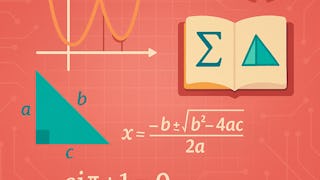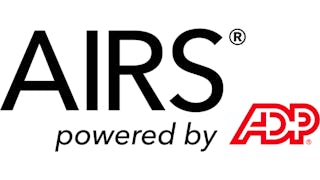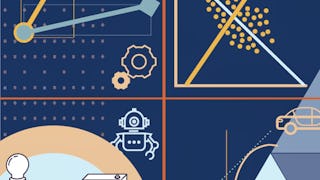Filter by
SubjectRequired
LanguageRequired
The language used throughout the course, in both instruction and assessments.
Learning ProductRequired
LevelRequired
DurationRequired
SkillsRequired
SubtitlesRequired
EducatorRequired
Explore the Precalculus Course Catalog
 Status: Free
Status: FreeUniversity of Pennsylvania
Skills you'll gain: Calculus, Advanced Mathematics, Mathematical Theory & Analysis, Applied Mathematics, Derivatives

Birla Institute of Technology & Science, Pilani
Skills you'll gain: Engineering Calculations, Integral Calculus, Calculus, General Mathematics, Trigonometry, Arithmetic, Differential Equations, Mathematical Theory & Analysis, Applied Mathematics, Algebra, Linear Algebra, Graphing, Derivatives
 Status: NewStatus: Free Trial
Status: NewStatus: Free TrialAutomatic Data Processing, Inc. (ADP)
Skills you'll gain: Talent Pipelining, Recruitment, Talent Acquisition, Applicant Tracking Systems, Talent Sourcing, Recruitment Strategies, Professional Networking, Strategic Sourcing, Stakeholder Engagement, Presentations, Interviewing Skills, Market Research
 Status: Free Trial
Status: Free TrialImperial College London
Skills you'll gain: Linear Algebra, Dimensionality Reduction, NumPy, Regression Analysis, Calculus, Probability & Statistics, Integral Calculus, Machine Learning Methods, Statistical Analysis, Statistics, Advanced Mathematics, Jupyter, Machine Learning Algorithms, Data Science, Mathematical Modeling, Applied Mathematics, Geometry, Artificial Neural Networks, Python Programming, Algorithms
 Status: Free Trial
Status: Free TrialVanderbilt University
Skills you'll gain: Prompt Engineering, ChatGPT, Generative AI, Data Visualization Software, Microsoft Excel, Data Analysis, Artificial Intelligence, Data Ethics, Large Language Modeling, Data Transformation, Data Processing, Human Machine Interfaces, Data Import/Export, Technical Communication, Automation, Risk Management Framework, Application Development, Verification And Validation

Amazon Web Services
Skills you'll gain: Amazon CloudWatch, Software Development Life Cycle, Infrastructure as Code (IaC), Operational Excellence, CI/CD, AWS CloudFormation, Software Architecture, AWS Identity and Access Management (IAM), Scripting, Amazon DynamoDB, Professional Networking, Amazon Web Services, Amazon S3, Extract, Transform, Load, Amazon Elastic Compute Cloud, Network Troubleshooting, Cloud Management, Data Management, Problem Solving, Teamwork
 Status: NewStatus: Free Trial
Status: NewStatus: Free TrialSkills you'll gain: NoSQL, Data Warehousing, SQL, Apache Spark, Apache Hadoop, Linux Commands, Database Administration, Data Architecture, Data Migration, Data Security, IBM DB2, Bash (Scripting Language), Data Pipelines, Apache Airflow, Database Design, MySQL, Cloud Storage, Database Management, Database Architecture and Administration, Extract, Transform, Load
 Status: Free Trial
Status: Free TrialSkills you'll gain: Dashboard, Web Scraping, Jupyter, Pandas (Python Package), Interactive Data Visualization, Data Structures, Data Processing, Data Science, Python Programming, Data Analysis, Data Capture, NumPy, Data Manipulation
 Status: Free Trial
Status: Free TrialSkills you'll gain: Bash (Scripting Language), Unix Shell, Operating Systems, Scripting, Command-Line Interface, Unix Commands, Unit Testing, File Systems, Linux Commands, OS Process Management, Software Testing, File Management, Python Programming, Test Driven Development (TDD), Data Import/Export, Automation
 Status: NewStatus: Free Trial
Status: NewStatus: Free TrialSkills you'll gain: Prompt Engineering, ChatGPT, Generative AI, Large Language Modeling, Application Deployment, Software Engineering, AI Personalization, Software Development, Software Testing, Data Ethics, DevSecOps, Test Case, Prototyping, Maintainability, Application Development, Application Frameworks, CI/CD, Java, Artificial Intelligence, Java Programming
 Status: Free Trial
Status: Free TrialVanderbilt University
Skills you'll gain: Prompt Engineering, ChatGPT, Generative AI, OpenAI, Data Ethics, AI Personalization, Artificial Intelligence, Large Language Modeling, Human Machine Interfaces, Risk Management Framework, Application Development, Scenario Testing, Performance Testing, Verification And Validation
 Status: Free Trial
Status: Free TrialUniversity of California, Santa Cruz
Skills you'll gain: Go (Programming Language), Debugging, C (Programming Language), Data Structures, C++ (Programming Language), Programming Principles, Object Oriented Programming (OOP), Computer Programming, Algorithms, Command-Line Interface, Unit Testing, Program Development, Software Technical Review, Computer Science, Software Testing, Distributed Computing, Integrated Development Environments, Data Storage, File Management
In summary, here are 10 of our most popular pre calculus courses
- Calculus: Single Variable Part 2 - Differentiation: University of Pennsylvania
- Basic Engineering Mathematics: Birla Institute of Technology & Science, Pilani
- Sourcing and Screening Applicants : Automatic Data Processing, Inc. (ADP)
- Mathematics for Machine Learning: Imperial College London
- Prompt Engineering: Vanderbilt University
- AWS Cloud Technology Consultant: Amazon Web Services
- IBM Data Architecture: IBM
- Python Project for Data Science: IBM
- Using Python to Interact with the Operating System: Google
- Generative AI for Java and Spring Developers: IBM










